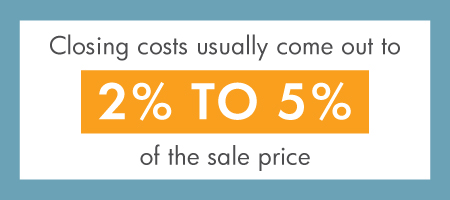Buying a home can be overwhelming if you're new to the world of real estate. That said, familiarizing yourself with the basic terminology can make you feel more prepared during each step of the home buying process.
Real Estate Vocabulary: 19 Terms You Should Know
Here are 19 real estate terms to know when buying a home.
Buyer’s market: This is when inventory in the housing market is relatively high. This gives buyers more choice of available homes while minimizing competition and bidding wars.
 Closing costs: The collective fees associated with purchasing a property are called closing costs. They usually come out to 2% to 5% of the sale price and often cover an appraisal, a home inspection, a title search, and mortgage origination.
Closing costs: The collective fees associated with purchasing a property are called closing costs. They usually come out to 2% to 5% of the sale price and often cover an appraisal, a home inspection, a title search, and mortgage origination. Comparable sales: Also known as “comps”, these are the sale prices of nearby properties. They help realtors and lenders determine listing prices and home values.
Contingencies: A contingency is written into the buyer/seller contract as a condition that must be met before a home sale closes.
Conventional loan: This type of home loan isn't backed by a government agency, such as the Federal Housing Administration (FHA) or the U.S. Department of Veterans Affairs (VA). Instead, they are available through private lenders, such as banks, credit unions, and mortgage companies. Conventional loan interest rates tend to be higher than those of government-backed mortgages.
Debt-to-income (DTI) ratio: Calculated by dividing your total monthly debt repayments by your monthly income, the number gives lenders an idea of your ability to repay a mortgage.
Down payment: This is the lump sum buyers pay upfront when purchasing a home. The total amount depends on the type of loan and the borrower's creditworthiness, but the minimum is usually between 3% to 15% of the sale price.
Earnest money: Earnest money is essentially a security deposit to show that the buyer is serious about purchasing the property. When the sale closes, it's usually applied to the down payment and closing costs, so you don't necessarily need to save extra for it. If you back out of the contract for an approved contingency, you will get your earnest money back.
 FHA loan: This type of home loan is issued by a bank or another private lender and insured by the Federal Housing Administration (FHA). In general, the lower your credit score and down payment, the higher the interest rate you'll pay on your FHA mortgage. This loan is typically the most affordable for first-time homebuyers.
FHA loan: This type of home loan is issued by a bank or another private lender and insured by the Federal Housing Administration (FHA). In general, the lower your credit score and down payment, the higher the interest rate you'll pay on your FHA mortgage. This loan is typically the most affordable for first-time homebuyers. In escrow: When a realtor says you're "in escrow," they mean the seller has accepted your offer but the sale has not yet closed. The period usually lasts 30 to 90 days.
Interest rate: Interest is an additional fee you'll pay to your lender throughout the life of your mortgage. The lower the interest rate, the better, as a larger sum will go toward your principal balance each month.
Loan estimate: This document outlines your mortgage loan amount, your down payment, expected closing costs, the lending terms, your estimated monthly payment, and a repayment schedule showing when your house will be paid off.
Monthly mortgage payment: This is the minimum amount you'll pay each month toward your home loan, including principal, interest, homeowner's insurance, and property taxes.
Private mortgage insurance (PMI): Insurance that a borrower might be required to buy as a condition of a conventional mortgage loan. Most lenders require PMI when a homebuyer’s down payment is less than 20% of the home's purchase price. PMI is intended to protect to lender.
.jpg) Pre-approval: A pre-approval letter letter means your lender has evaluated your financial situation and is ready to move forward with a mortgage once you make an offer.
Pre-approval: A pre-approval letter letter means your lender has evaluated your financial situation and is ready to move forward with a mortgage once you make an offer. Pre-qualification: This basic assessment of your finances gives you an estimate of how much you can borrow for a home. It usually doesn't require a credit check.
Property Tax: Homeowners pay tax calculated by the local government where the property is located. Property tax is based on the value of the property and tangible personal property. The amount paid is determined by multiplying the property tax rate by the current market value of the land.
Seller's market: This is when low inventory creates high competition among buyers, often leading to bidding wars.
Underwriting: The process lenders use to evaluate a mortgage loan for a property after the seller has accepted the buyer's offer is called underwriting. It typically takes 30 to 60 days.
First-time home buying assistance from our Oregon credit union
Now that you're up to speed on some of the most common real estate definitions, you might consider taking the next steps toward homeownership. CCCU offers many mortgage programs with flexible terms and competitively low interest rates.
Members of our Oregon credit union have access to a trusted network of realtors, loan application assistance, and guidance on closing. You can also set up a tax-deductible first-time homebuyer savings account.
We proudly serve people who live, work, worship, own a business, or and attend school in Multnomah, Clark, Washington, Hood River, Clackamas, and Yamhill, Columbia, and Skamania counties, or are a relative of a current member. We have three physical branches in Portland and one in Hood River, convenient mobile banking, plus access to 5,600+ CO-OP Shared Branches and over 30,000 surcharge-free CO-OP ATMs nationwide! Join us today!



